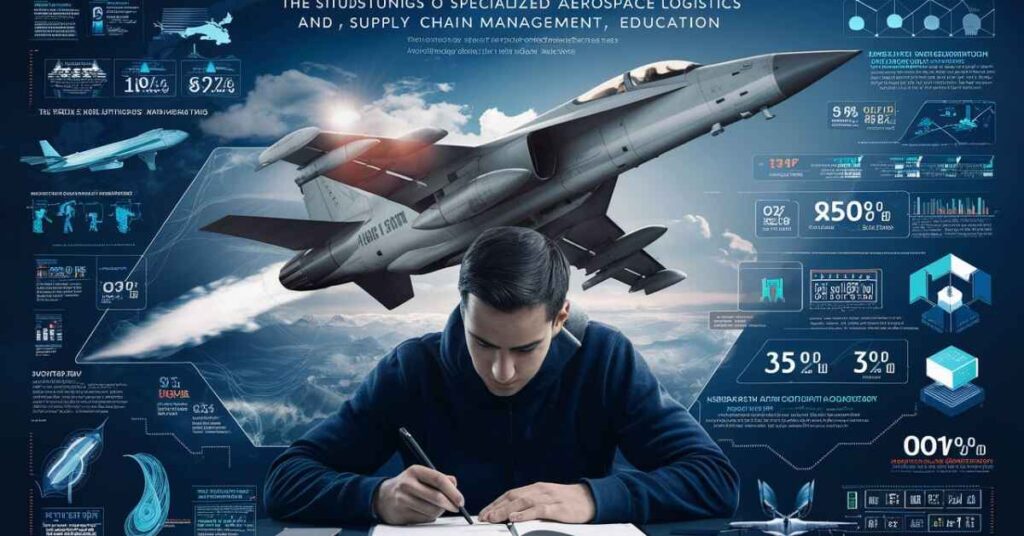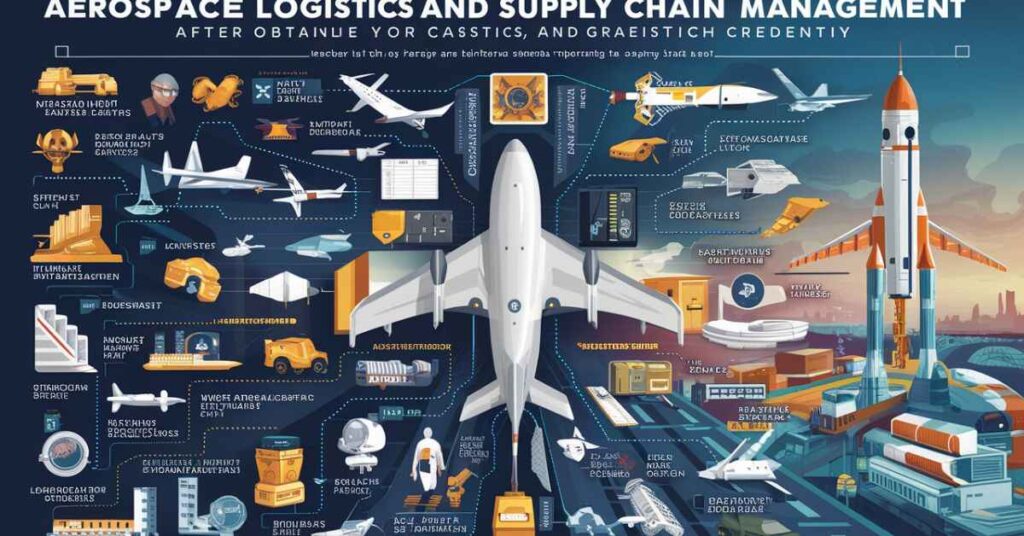The aerospace industry is an active ever-evolving segment that captures the thoughts of people worldwide. From money-making airlines transporting millions of passengers annually to spacecraft exploring the vast unknown, this field represents the high point of technological invention and global connectivity.
However, behind the scenes, a difficult web of logistics and supply chain processes ensures that every airplane, rocket, and satellite functions without a glitch.
What is Aerospace Logistics and Supply Chain Management?
Upper atmosphere logistics and supply chain management incorporate the wide-ranging planning execution control of the flow of goods services related information from the point of foundation to the point of feeding within the aerospace sector. This multi-layered field involves coordinating the achievement, production, distribution, and distribution of aircraft modules, engines, avionics, and numerous other particular parts and materials.
The sheer scale and difficulty of aerospace supply chains are amazing. Consider the development of a moneymaking airliner, which normally involves thousands of individual modules sourced from merchants across the globe. Each part must adhere to inflexible quality morals and regulatory desires before being beside yourself to the final assembly line. Delays or disruptions in this intricate supply network can have simple consequences, potentially preparing entire fleets and consequential in substantial commercial damages.
Well-organized logistics and supply chain management are vital to continuing the seamless flow of processes within this high-stakes industry. Experts in this field must have a deep acceptance of global transportation modes (air, sea, and land), customs regulations, inventory organization techniques, and cutting-edge technologies for tracing and monitoring consignments.
Read this Blog: Unlocking Opportunities: Warehousing Jobs in Supply Chain Management for Degree and Certificate Holders
The Value of Specialized Aerospace Logistics & SCM Education

Though general business or supply chain degrees provide a solid basis chasing a specialized education in exosphere logistics and supply chain management offers numerous different benefits. These focused programs delve into the nuances and challenges specific to the aviation and aerospace sectors, equipping graduates with the knowledge and skills to excel in this dynamic field.
- Global Transportation and Shipping Regulations: Students gain in-depth knowledge of the complex web of international regulations prevailing in the transportation of aerospace parts materials and finished products. This includes learning complex customs procedures trade arrangements and country-specific rules.
- Inventory Management for Highly Regulated Parts and Materials: Aerospace modules are subject to inflexible quality control measures and often have exclusive storage and handling necessities. Specific coursework covers best observations for managing inventory heights reducing obsolescence and ensuring agreement with industry values.
- Analytics for Optimizing Complex Supply Chains: Through progress in data analysis forecasting operations research students learn to leverage advanced investigative techniques to optimize aerospace supply chains. This includes classifying bottlenecks minimizing costs maximizing effectiveness across the perfect network.
- Managing Procurement, Sourcing, and Contracts for Aerospace: The aerospace industry is dependent on a vast network of traders and vendors, each with unique contractual responsibilities and quality declaration requirements. Dedicated courses prepare students to direct this complex procurement landscape, ensuring the timely delivery of high-quality modules.
Moreover, many aerospace logistics and supply chain management programs adopt an interdisciplinary attitude, integrating perceptions from processes management materials science engineering other appropriate fields. This holistic viewpoint equips progresses with a well-rounded skillset tailored to the single demands of the aerospace industry.
Hands-on experience is also a critical component of these dedicated programs. Through capstone projects, case studies, and internships, students have the chance to apply their knowledge to real-world aerospace situations, further honing their problem-solving capabilities and gaining invaluable industry experience.
Examples of Aerospace Logistics & SCM Degree/Certificate Programs
While numerous universities offer specialized programs in aerospace logistics and supply chain management, a few notable examples include:
- Embry-Riddle Aeronautical University: This renowned aviation-focused institution offers a B.S. in Aviation Logistics and Supply Chain Management and a Master of Science in Logistics and Supply Chain Management with an aerospace concentration.
- University of North Dakota: UND’s Aerospace Logistics and Supply Chain Management program is designed to prepare students for careers in aviation and aerospace logistics, transportation, and distribution.
- Southern Illinois University Carbondale: The university’s Aviation Management program offers a specialization in Aviation Logistics and Supply Chain Management, equipping students with the skills to manage complex aviation operations.
Many of these programs also offer online or hybrid options, allowing working professionals to pursue advanced education while maintaining their careers.
In-Demand Career Paths with an Aerospace Logistics & SCM Credential

Graduates with specialized degrees or certificates in aerospace logistics and supply chain management are well-positioned to chase a variety of rewarding career routes within the industry. Some of the most in-demand roles include:
Aerospace Logistics Manager
As an aerospace logistics manager, specialists oversee the entire logistics operation for an aerospace company or separation. This includes managing the transport, warehousing, and distribution of parts materials, and finished products. Key responsibilities may include:
- Developing and implementing logistics strategies to ensure timely and cost-effective delivery
- Coordinating with suppliers, manufacturers, and customers to streamline material flow
- Analyzing data and identifying opportunities for process improvements
- Ensuring compliance with relevant regulations and industry standards
- Managing logistics personnel and budgets
Usual education requirements for this role include a bachelor’s or master’s degree in aerospace logistics, supply chain management, or a related field. According to PayScale, the normal salary for an aerospace logistics manager in the United States is around $77,000 per year.
Aerospace Supply Chain Analyst
Supply chain experts play a critical role in improving the complex network of suppliers, manufacturers, and wholesalers within the aerospace industry. Their primary duties involve:
- Analyzing supply chain data to identify inefficiencies, bottlenecks, and areas for improvement
- Developing forecasting models and demand planning strategies
- Collaborating with cross-functional teams to implement process improvements
- Monitoring key performance indicators (KPIs) and preparing reports
- Evaluating and selecting potential suppliers and vendors
While some entry-level locations may be available with a bachelor’s degree, many employers prefer applicants with a master’s degree in aerospace supply chain management or a related measurable field. According to Glassdoor, the average salary for an aerospace supply chain analyst in the US is around $68,000 per year.
Procurement/Sourcing Specialist for Aerospace
Procurement and sourcing specialists are responsible for acquiring the vast array of parts, materials, and services required for aerospace manufacturing and operations. Their duties may include:
- Identifying and evaluating potential suppliers based on cost, quality, and delivery capabilities
- Negotiating contracts and purchase agreements with vendors
- Implementing strategic sourcing initiatives to reduce costs and mitigate risks
- Collaborating with engineering teams to ensure compliance with technical specifications
- Managing supplier relationships and performance
Most managers in the aerospace industry require a bachelor’s degree in supply chain management, logistics, or a related field for entry-level procurement positions. specialized degree or certificate in aerospace procurement can provide a significant advantage. According to PayScale, the usual salary for an aerospace procurement professional in the US is around $65,000 per year.
Professional Certifications That Provide an Edge
In addition to formal academic qualifications, professionals in the aerospace logistics and supply chain management field can additionally enhance their knowledge and career prospects by hunting industry-recognized certifications. Some of the most valued certifications include:
- Certified Professional in Supply Management (CPSM) from the Institute for Supply Management (ISM): This internationally recognized certification validates an individual’s knowledge and expertise in supply management including procurement sourcing supplier relationship management and overall supply chain management.
- Certified in Production and Inventory Management (CPIM) from APICS (Association for Supply Chain Management): The CPIM certification focuses on taking part in systems and procedures across the supply chain, covering topics such as demand management, procurement, material requirements planning, and inventory control.
- Certified Logistics Associate (CLA) and Certified Logistics Technician (CLT) from the Manufacturing Skill Standards Council (MSSC): These entry-level certifications determine proficiency in the core knowledge ranges of logistics, including product receiving, transportation, inventory control, and safe material handling.
- Certified Professional Logistician (CPL) from the International Society of Logistics: This certification is specially designed for logistics experts in the aerospace and defense industries.
Obtaining these industry certifications not only validates an individual’s expertise but also demonstrates a commitment to skilled development and constant learning, which can be highly valued in the rapidly growing aerospace sector.
Preparing for Global Opportunities
As the aerospace industry continues to expand its global footprint, professionals in logistics and supply chain management must be prepared to navigate the complexities of international operations. Success in this arena requires a combination of technical knowledge and cross-cultural awareness.

One critical aspect is developing an understanding of the diverse cultural norms, business practices, and regulatory environments that govern logistics operations in different regions of the world. For example, supply chain professionals working with aerospace manufacturers in Asia may need to navigate unique customs procedures, local transportation infrastructure challenges, and cultural nuances in supplier relationships.
Additionally, proficiency in foreign languages can be a valuable asset for those pursuing global opportunities within aerospace logistics and supply chain management. While English is widely used as the lingua franca in international business, the ability to communicate effectively in languages such as Spanish, Mandarin, Arabic, or French can greatly facilitate collaboration with international partners and suppliers.
Conclusion
The aerospace industry is a dynamic, global sector that trusts heavily on effective logistics and supply chain operations to keep aircraft, satellites, and other cutting-edge technologies increasing. With a specialized degree or certificate in aerospace logistics and supply chain management, specialists can embark on rewarding careers at the front position of this exciting field.
From handling intricate global supply networks to improving procurement and sourcing strategies, these extremely skilled experts play an essential role in ensuring the seamless flow of parts, materials, and finished products across worldwide borders. With a deep acceptance of industry-specific guidelines, inventory management techniques, and advanced analytics, they are well-appointed to tackle the unique tasks of this high-stakes sector.


![Find a Section 8 houses for rent with no deposit Revealed! [2024]](https://busslirra.com/wp-content/uploads/2024/08/Find-a-Section-8-houses-for-rent-with-no-deposit-Revealed-2024-300x157.jpg)







![Find a Section 8 houses for rent with no deposit Revealed! [2024]](https://busslirra.com/wp-content/uploads/2024/08/Find-a-Section-8-houses-for-rent-with-no-deposit-Revealed-2024-150x150.jpg)
